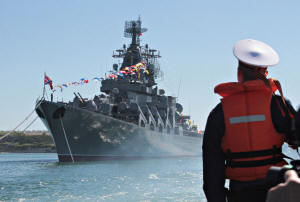Russia says crippled warship to be towed back to port, as Ukraine claims
missile hit
 Send a link to a friend
Send a link to a friend
 [April 14, 2022]
By Pavel Polityuk and Oleksandr Kozhukhar [April 14, 2022]
By Pavel Polityuk and Oleksandr Kozhukhar
KYIV/LVIV, Ukraine (Reuters) - Russia said
the crew of its Black Sea fleet flagship were evacuated on Thursday and
measures were being taken to tow the ship back to port after an
explosion of ammunition on board that Ukraine said was caused by a
missile strike.
Russia's defence ministry said the fire on the Soviet-era missile
cruiser Moskva had been contained, but left the ship badly damaged. It
did not acknowledge the ship had been attacked and said the cause of the
fire was under investigation.
Ukraine's southern military command said that it hit the warship with a
Ukrainian-made Neptune anti-ship missile and that it had started to
sink.
Reuters was unable to verify either side's statements.
The loss or disabling of the Moskva would be another blow for Russia -
on the 50th day of its war in Ukraine - as it readies for a new assault
in the eastern Donbas region that is likely to define the outcome of the
conflict.
Russia's navy has launched cruise missiles into Ukraine and its
activities in the Black Sea are crucial to supporting land operations in
the south of the country, where it is battling to seize full control of
the port of Mariupol.

Russian news agencies said the Moskva, commissioned in 1983, was armed
with 16 anti-ship Vulkan cruise missiles with a range of at least 700 km
(440 miles).
Kyiv says the Moskva featured in one of the landmark early exchanges of
the war, when Ukrainian border guards on Snake Island, a small outcrop
in the Black Sea, told the ship to "Go fuck yourself" after it demanded
they surrender.
'MASSING TROOPS'
Russian forces have pulled back from some northern parts of Ukraine
after suffering heavy losses and failing to take the capital Kyiv.
Ukraine and its Western allies say Moscow is redeploying for a new
offensive.
"Russian forces are increasing their activities on the southern and
eastern fronts, attempting to avenge their defeats," Ukrainian President
Volodymyr Zelenskiy said in a Wednesday night video address.
Ukraine's Deputy Defence Minister Hanna Malyar said in televised
comments on Thursday that Russia was massing troops not only along the
Russia-Ukraine border, but also in Belarus and Moldova's breakaway
Transdniestria region.
Authorities in Transdniestria, which borders southern Ukraine, have
previously denied Russia was preparing forces there to deploy in
Ukraine.
The Kharkiv, Donetsk and Zaporizhzhia regions in the country's east were
being hit by missile strikes, Malyar said. Kharkiv's governor said four
civilians had been killed by shelling.

Russia said on Wednesday that more than 1,000 Ukrainian marines from one
of the scattered units still holding out in the shattered city had
surrendered. Ukrainian officials did not comment.
If it is taken, Mariupol - Ukraine's main Sea of Azov port that has been
besieged and bombarded for weeks - would be the first major city to fall
to Russian forces since they invaded on Feb. 24.
Its capture would allow Russia to reinforce a land corridor between
separatist-held eastern areas and the Crimea region it seized and
annexed in 2014, and free up forces for a wider offensive.
HUMANITARIAN CORRIDORS
Ukrainian Deputy Prime Minister Iryna Vereshchuk said nine humanitarian
corridors had been agreed on for Thursday to evacuate civilians,
including by private car, from Mariupol.
[to top of second column]
|

A sailor looks at the Russian missile cruiser Moskva moored in the
Ukrainian Black Sea port of Sevastopol, Ukraine 10, 2013.
REUTERS/Stringer/File Photo
 Ukraine says tens of thousands of
people are believed to have been killed in Mariupol.
Mariupol's mayor, Vadym Boichenko, said Russia had brought in mobile
crematoria "to get rid of evidence of war crimes" - a statement that
it was not possible to verify independently.
Moscow has blamed Ukraine for civilian deaths and accused Kyiv of
denigrating Russian armed forces.
In the village of Lubianka northwest of Kyiv, from where Russian
forces had tried and failed to subdue the capital before retreating,
a message to Ukrainians had been written on the wall of a house that
had been occupied by Russian troops.
"We did not want this ... forgive us," it said.
The Kremlin says it launched a "special military operation" to
demilitarise and "liberate" Ukraine from nationalist extremists, a
message villagers said had been repeated to them by the Russian
troops.
"To liberate us from what? We're peaceful ... We're Ukrainians,"
Lubianka resident Viktor Shaposhnikov said.
A mission of experts set up by Organization for Security and
Cooperation and Europe (OSCE) nations said on Wednesday it had found
evidence of war crimes and crimes against humanity by Russia in
Ukraine.
Russia has denied targeting civilians and said some reports have
been staged for propaganda purposes.

Andriy Nyebytov, head of the Kyiv region police, said more than 800
bodies had been found in three districts which had been occupied by
Russian forces.
"We are finding terrible things: buried and hidden bodies of people
who were tortured and shot, and who died as a result of mortar and
artillery fire," Nyebytov said in televised comments. His statements
could not immediately be verified.
RUSSIA ISOLATED
Moscow's incursion, the biggest attack on a European state since
1945, has seen more than 4.6 million people flee abroad, killed or
wounded thousands and left Russia increasingly isolated on the world
stage.
Western-led sanctions have triggered the worst economic crisis in
Russia since the 1991 fall of the Soviet Union, say analysts. More
than 600 companies, including McDonalds, have announced their
withdrawal from Russia, which will directly cause the loss of about
1 million jobs.
Overall, 2.6 million people may fall below Russia's official poverty
line this year, the World Bank estimates.
The conflict has also galvanised NATO and prompted Russia's
neighbours Sweden and Finland to discuss joining the Western
military alliance.
Dmitry Medvedev, deputy chairman of Russia's Security Council and
one of President Vladimir Putin's closest allies, warned on Thursday
that such a move would force Russia to bolster its defences in the
Baltic region, including by deploying nuclear weapons.
(Additional reporting by Natalia Zinets and Elizabeth Piper in Kyiv,
Max Hunder in London, David Ljunggren in Ottawa and Reuters bureaus;
Writing by Michael Perry and Alex Richardson; Editing by Stephen
Coates and Hugh Lawson)
[© 2022 Thomson Reuters. All rights
reserved.] This material may not be published,
broadcast, rewritten or redistributed.
Thompson Reuters is solely responsible for this content. |